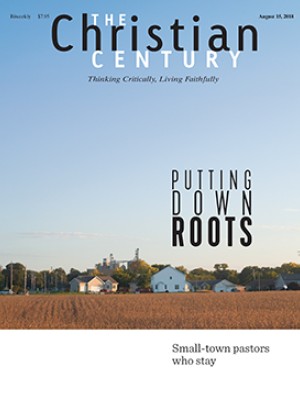I have always been fascinated by the Bible’s healing stories, especially Jesus’ specific methods of healing. He lays hands on people; he says “be healed”; he tells people—on the sabbath—to pick up their mats and walk. Sometimes he is in conversation with people, and in the process of interacting with him they are healed. This is the case, for example, in John 5, when Jesus asks the man at the pool of Bethesda, “Do you want to get well?”
Jesus’ methods and modes of healing in Mark 7 might be the oddest of all. In verses 31–37 he is in Sidon, in the region of the Decapolis, where he encounters a man who is deaf and mute. The people plead with Jesus to lay hands on this man. Instead, Jesus puts his fingers in the man’s ears. Then he spits and touches the man’s tongue.
Read our latest issue or browse back issues.
Just before that in the region of Tyre, Jesus is trying to avoid being seen or found, which he never seems to do well, when a gentile woman born in Syrophoenicia bows before him and pleads for him to drive a demon out of her daughter. Reading the story quickly, you might miss it—but did Jesus just call that woman a dog?
Why does Jesus have to do that? This week’s text causes me a bit of discomfort. Could he have been more tactful, more diplomatic? This isn’t the best mode of pastoral care. Commentators explain that Jesus is saying that healing is for the children of Israel first and only then for the gentiles. Still, his words to her make me uneasy.
And yet, the text reminds us of the reality we see today, in a world of haves and have-nots. There are some who benefit and receive and others who have to wait in line. Naming that causes a bit of discomfort.
At The Gathering Chicago, the emerging ministry plant in which I pastor, one of our first initiatives was a #HealingRacism group. It wasn’t that we decided we wanted the first ministry of the community to be about healing racism. The need arose because during the months in which we launched this new community of prayer and service, black Chicago youth were being killed and protests against police brutality were taking place in the city. A series of killings of unarmed black people around the country had risen to public attention as well.
When we gathered that first Thursday, for a #HealingRacism brown bag book discussion of Charles Mills’s The Racial Contract, the need became clearer. People have difficulty talking about race and examining race and racism as an issue, a problem, and a root cause. (Other books along the #HealingRacism journey have included the 1985 Kairos Document by South African theologians, and subsequent Kairos Documents from other nations and movements, as well as Kelly Brown Douglas’s book Stand Your Ground: Black Bodies and the Justice of God.)
In this Mark 7 text, Jesus delineates the line of privilege very clearly. “Let the children be fed first, for it is not fair to take the children’s food and throw it to the dogs.”
What is Jesus saying here? Is this comment intended to stop the woman from pursuing what she came for, the healing and deliverance of her daughter? Whether or not that is Jesus’ intention, that’s not what happens. She seems unfazed by his comments. She tells him that “even the dogs under the table eat the children’s crumbs.”
Then Jesus announces to her, “For saying that, you may go—the demon has left your daughter.” She goes home and finds that it’s true.
What is it about the woman’s reply to Jesus that makes the difference? Why does he end up affirming the healing and deliverance of her daughter?
In this story, the problem of stratification and hierarchy comes up even in the realm of healing. But the story is marked as well by the woman’s persistence. If it is true that Jesus came first for the children of Israel and then after that for the rest, the woman demonstrates that perseverance and protest can bring about a new paradigm. Syrophoenician or not, this woman’s daughter is healed, delivered, and set free.
Exploring this text is unsettling. So is uncovering the wounds of racism in relation to church complicity. Perhaps the directness of the dialogue between Jesus and this unnamed Syrophoenician woman reminds us to name the differences and call out the hierarchies. In order to be delivered from these demons that hold our society hostage, we have to name things clearly. This is a first step in the process toward full healing and restoration.




